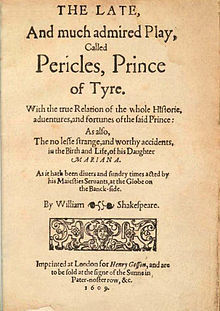Pericles, Prince of Tyre
Pericles, Prince of Tyre is a Jacobean play written at least in part by William Shakespeare and included in modern editions of his collected works despite questions over its authorship, as it was not included in the First Folio. Whilst various arguments support that Shakespeare is the sole author of the play (notably DelVecchio and Hammond's Cambridge edition of the play), modern editors generally agree that Shakespeare is responsible for almost exactly half the play—827 lines—the main portion after scene 9 that follows the story of Pericles and Marina. Modern textual studies indicate that the first two acts of 835 lines detailing the many voyages of Pericles were written by a collaborator, which strong evidence suggests to have been the victualler, panderer, dramatist and pamphleteer George Wilkins.

Date and text
Most scholars support 1607 or early 1608 as most likely, which accords well with what is known about the play's likely co-author, George Wilkins, whose extant literary career seems to span only three years, 1606 to 1608. The only published text of Pericles, the 1609 quarto (all subsequent quartos were reprints of the original), is manifestly corrupt; it is often clumsily written and incomprehensible and has been interpreted as a pirated text reconstructed from memory by someone who witnessed the play (much like theories surrounding the 1603 "bad quarto" of Hamlet). The play was printed in quarto twice in 1609 by the stationer Henry Gosson. Subsequent quarto printings appeared in 1611, 1619, 1630, and 1635; it was one of Shakespeare's most popular plays in his own historical era. The play was not included in the First Folio in 1623; it was one of seven plays added to the original Folio thirty-six in the second impression of the Third Folio in 1664. William Jaggard included Pericles in his 1619 False Folio.
The editors of the Oxford and Arden editions of Pericles accept Wilkins as Shakespeare's collaborator, citing stylistic links between the play and Wilkins's style that are found nowhere else in Shakespeare. The Cambridge editors reject this contention, arguing that the play is entirely by Shakespeare and that all the oddities can be defended as a deliberately old-fashioned style; however, they do not discuss the stylistic links with Wilkins's work or any of the scholarly papers demonstrating contrary opinions. If the play was co-written or revised by Wilkins, this would support a later date, as it is believed Wilkins' career as a writer spanned only the years 1606-8. The 1986 Oxford University Press edition of the Complete Works and the subsequent individual edition include a "reconstructed text" of Pericles, which adapts passages from Wilkins' novel on the assumption that they are based on the play and record the dialogue more accurately than the quarto.
The play has been recognised as a probable collaboration since 1709, if not earlier. In that year Nicholas Rowe wrote, "there is good Reason to believe that the greatest part of that Play was not written by him; tho' it is own'd, some part of it certainly was, particularly the last Act." Rowe here seems to be summarising what he believes to be a consensus view in his day, although some critics thought it was either an early Shakespeare work or not written by him at all. Wilkins has been proposed as the co-author since 1868. In 1919, H. Dugdale Sykes published a detailed comparison of numerous parallels between the first half of Pericles and four of Wilkins's works, but he thought that Wilkins's novelisation of the play preceded its composition. Many other scholars followed Sykes in his identification of Wilkins, most notably Jonathan Hope in 1994 and MacDonald P. Jackson in 1993 and 2003. In 2002, Prof. Brian Vickers summarised the historical evidence and took the Cambridge editors to task for ignoring more than a century of scholarship.

















0 comments
Sign in or create a free account